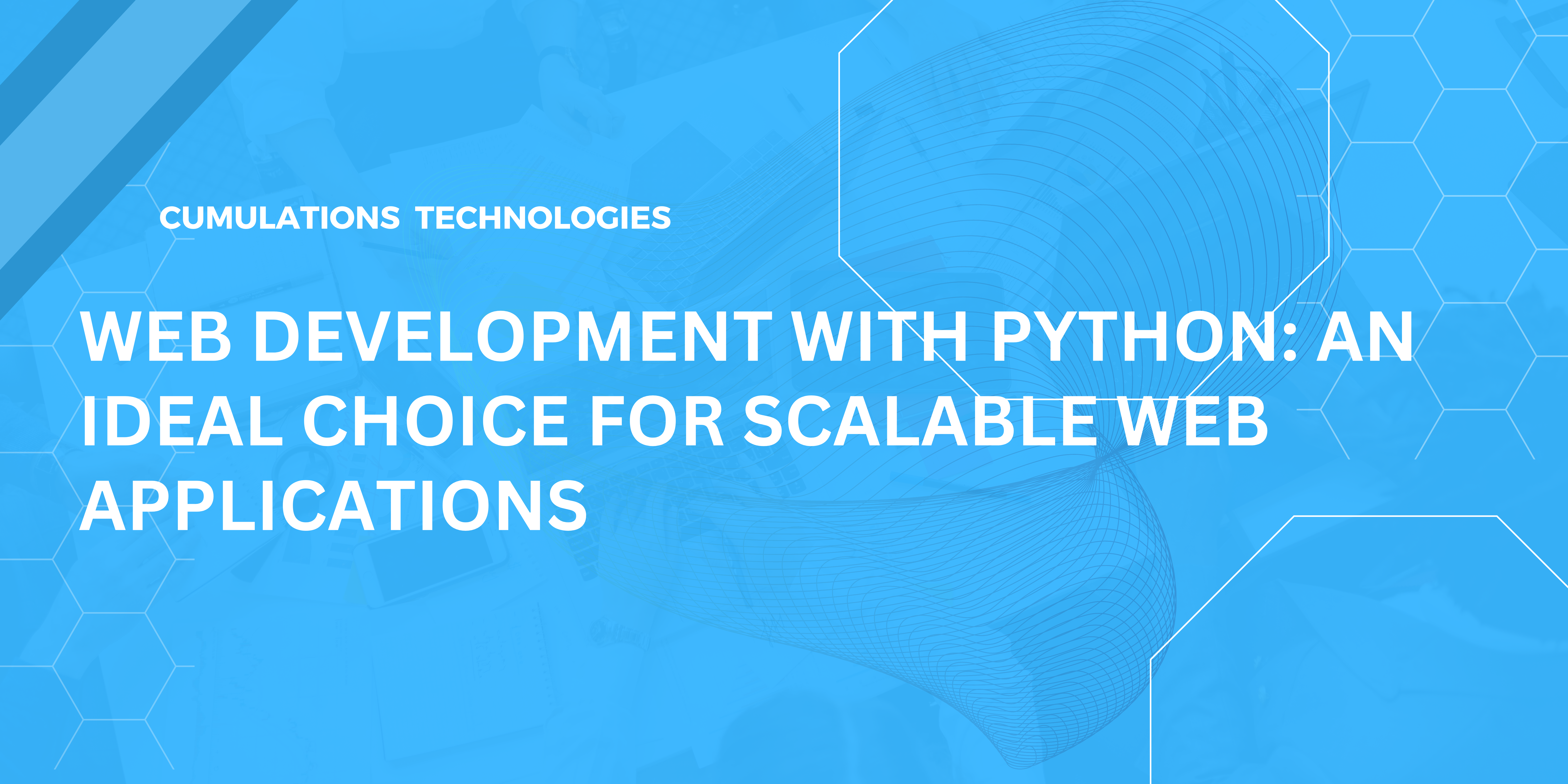
Being one of the well-known and emerging languages for web development, Python offers greater efficiency and flexibility to create high-end and scalable web apps.That’s the reason why web Development with Pythont is in demand of late. It’s a simple and easy-to-read language that boasts many powerful frameworks like Django and Flask. It improves the overall development speed.
The versatility of Python lets developers handle everything from front-end to back-end functionality with ease. Be it libraries, other technology, or strong community support, Python can be integrated with everything. That’s the reason why it emerged as a top choice when it comes to developing scalable, dynamic, and also high-performing web apps
In this post, we will discuss what makes Python a perfect choice for developing scalable web apps and also can Python be used for web development.
Why Choose Python for Web Development?
As mentioned, Python has become a popular choice among developers, when it comes to web development. There are several reasons for this. Some of them are as follows.
Simplicity
Python includes easy reading, and simple, and clean syntax, which makes it perfect for both beginners and experienced developers. It prevents developers from dealing with complex code and focusing on solving problems. It also boosts the overall speed of the development process.
Highly Versatile
Another reason for choosing Python for web development is it can be used for an array of applications beyond web development, be it AI, data analysis, or ML. This kind of versatility of this programming language enables developers to leverage it across multiple domains even without using other languages.
Comprehensive Frameworks
Python includes robust web frameworks like Flask, Django, and many others. These frameworks play a vital role to simplify the development process and help you create secure and feature-rich web apps. These Python frameworks are available with various pre-built modules for certain common tasks, including user authentication and database management.
Vast Developer CommunityPython is popular for having an active community that offers various extensive resources, tools, libraries, and more. With this language, developers also get support through forums, documentation, tutorials, etc.
Cross Platform Compatibility
The most interesting fact about Python is its compatibility with various operating systems, be it macOS, Windows, or Linux. It ensures the app developed with this programming language functions smoothly across multiple environments.
Highly Secured
When it comes to security, it’s a primary concern in web development. Python is capable of handling it properly. Frameworks like Django include built-in security features like cross-site scripting, SQL injection, clickjacking, and more.
Popular Python Web Frameworks
As mentioned, Python is available with numerous frameworks that ease out complications in web development. Let’s have a look at some of the top Python frameworks.
1. Django
As one of the features and established web frameworks, Python brings the possibility of developing complicated and database-driven websites. It follows the MTV (Model-View-Template) architecture. It focuses on the ‘don’t repeat yourself’ (DRY) principle. That’s the reason why Django is a great choice for those projects that need quick development and deployment.
Django is better known for having its “batteries-included” philosophy. It’s available with ORM, built-in admin panel, authentication, form handling, etc. It also includes many other tools that one can customize according to your project needs.
This Python web development framework includes many security features such as cross-site scripting, SQL injection, etc. It’s also available with large community support, extensive documentation, etc., which makes it a perfect choice for beginners and experienced developers.
2. FastAPI
FastAPI is another framework that earned vast popularity for creating APIs. It focuses on delivering outstanding performance and emerges as a great competitor of Node.js and Go. The framework uses Python’s type hints to offer an automatic request validation and also a complete documentation generation with the use of JSON Schema and OpenAPI.
Developed on Starlette, FastAPI is capable of web handling and Pydantic for data validation. It’s a developer-friendly and quick framework that excels in creating RESTful APIs and also microservices for having its non-blocking architecture. FastAPI is also popular for its minimal boilerplate code, which makes it easy to use and fully productive for developers who create scalable APIs with a higher efficiency.
3. Flask
If you are looking for a flexible and lightweight framework, you should opt for Flask. It’s apt for small to mid-sized apps. It’s available with various necessary features including request handling, routing, templating, and more.
This kind of simplicity allows developers to enjoy great liberty to select various third-party libraries or extensions based on their actual needs, which makes it a fully customizable and the best Python framework for web development. Apart from having simplicity, the framework is versatile and also can scale when required.
The credit goes to its vast ecosystem of extensions such as Flask-SQLAlchemy for database handling and Flask-WTF for form validation. The framework doesn’t necessitate any specific project structure and lets developers organize the codebase as they see fit.
4. Pyramid
Pyramid gained popularity for being an adaptable web framework that tends to scale for many small and large apps. Flexibility is one of the strengths of this Python framework, which gives developers the liberty to start small and then scale up as the app grows. That’s the reason why Pyramid is a perfect option for those projects that tend to expand with time.
The framework mainly follows a minimalist approach at its core and also offers a robust tool for security, URL mapping, configuration, etc. It has great documentation, which makes it fully accessible for developers with varied experience levels. Pyramid is customizable and also supports both NoSQL and SQL-based databases.
5. Bottle
Bottle is another lightweight and simple micro-framework that is perfect for small projects and also for those who seek minimal dependencies. The entire framework comes with a single Python file, which makes it a perfect choice to create small-scale web apps, prototyping, or APIs.
Apart from this, Bottle also supports many necessary features such as templating, routing, request/response handling, and more. It can be also integrated conveniently with various databases and is also quite often used for standalone, small apps. Beginners also leverage it as a learning tool for web development usingPython.
How to Do Web Development with Python?
For web development with Python, developers can implement various front-end and back-end technologies. Let’s explore here the detailed information regarding how to use Python for web development.
1. HTML and CSS
Hypertext Markup Language (HTML) is a key element of any web page. It determines the overall structure of your web content and also organizes several elements like paragraphs, headings, images, forms, etc.
Developers leverage HTML for creating layouts of web pages and use Cascading Style Sheets (CSS) to style various elements like deciding fonts, colors, spacing, etc.
2. JavaScript
JavaScript is necessary to make your web page highly interactive. Being a client-side language, it’s capable of controlling pages even without reloading them. For instance, be it dynamic content updates, validations, or animation, everything relies on JavaScript. It ensures hassle-free front-end user interaction, especially when paired with Python on the backend.
3. DOM and jQuery
When it comes to Document Object Model (DOM), it enables JavaScript to access and also manipulate various HTML elements. JavaScript works on the client-side DOM mainly to change or update parts of a webpage in response to user actions.
Being a JavaScript library, jQuery simplifies the DOM manipulation with concise code. It helps you animate elements, update page content, and handle user events even without putting in less effort.
4. Web Frameworks
As mentioned, Python web frameworks like Django, Flask, and others are capable of handling backend logic, database interactions, request routings, etc. Django is a higher-level framework, which is available with an admin interface, Object-Relational Mapping (ORM), and a range of tools to build and deploy web apps quickly.
As far as Flask is concerned, it’s a lightweight framework that offers a higher flexibility. It’s the most appropriate option for small applications
Learning Roadmap for Web Development with Python
Learning a roadmap for full-stack web development with Python generally starts with getting in-depth knowledge of the basics of Python programming, including functions, data types, loops, and object-oriented programming.
After getting a clear concept of the basics, one should learn HTML, CSS, and JavaScript, which is necessary for front-end development. Get in-depth knowledge of various Python web frameworks including Django, Flask, etc, to create dynamic web apps or websites.
Learners should gather in-depth details of database management with the use of SQL and ORM libraries like Django ORM or SQLAlchemy. It’s also necessary to explore various deployment tools and version control for various production-ready apps.
Python Libraries for Web Development
Python is widely used in web development due to its simplicity, versatility, and powerful libraries. Several frameworks and libraries make building web applications in Python efficient and scalable. Here’s a look at some of the most popular Python libraries for web development:
1. Web2py
Web2py is a highly popular and the most powerful framework. Being an easy-to-use and quick setup, it enables developers to create, deploy, and maintain web apps quickly even without any need for installation or configuration.
Web2py has its own IDE (Integrated Development Environment), which eases out the complications of the overall development process. Based on MVC architecture, Web2py is available with powerful security features such as cross-site scripting 9XSS), SQL injection, cross-site request forgery (CSRF), etc.
2. TurboGears
TurboGears can scale large apps with less complication. With this, developers get an option to initiate with a single file app and scale it into a highly complex and modern design. It offers complete support for different databases, along with several built-in template engines including Genshi, which makes it a perfect choice for quick web development.
3. NumPy
NumPy is a library that plays a vital role specifically for those apps that need numerical operations. It’s considered to be a perfect option for web apps that involve processing vast datasets, data analytics, or integration of machine learning models.
It’s available with robust objects and also mathematical functions that allow developers to handle even complex calculations with higher efficiency.
4. Pandas
Being a reliable and high-level data manipulation tool, Pandas is an important web app that involves data analysis, specifically for statistical and financial apps. It’s available with easy-to-use data structures including DataFrames, which enable developers to perform their tasks hassle-free with highly structured data. Pandas can be integrated perfectly with apps where data requires to be cleaned, processed, or displayed.
5. PyQt
Though PyQt is the best option for building desktop apps, it can indeed be integrated into web development to offer a GUI-based user interface for web apps. This is specifically useful when creating complicated web apps that require a visually appealing and interactive front end.
How Much Does It Cost to Develop Web Applications with Python?
Well, there’s no fixed cost of developing web apps with Python. It varies based on numerous factors like features, complexity, expertise of developers, etc. Developing a basic web app with Python may cost ranging from $10,000 to $25,000. Moreover, if you opt to develop complex web apps with cutting-edge features, it may cost ranging from $20,000 to $70,000.
Creating enterprise-level apps may exceed even $70,000. As far as rates of developers are concerned, these vary based on the location of developers. If you hire developers from the US, they may charge between $50 to $200 on an hourly basis.
Advantages of Using Python to Create Web Applications
Developing web apps with Python offers a plethora of advantages. Let’s explore some of those most promising advantages.
1. Fast Development
As mentioned, Python has an enormous ability to enhance the speed of the web development process. Developers find it easy to write clean code quickly. It allows them to concentrate on solving various business issues irrespective of getting bogged down in complicated language intricacies.
Apart from this, Python also supports different paradigms making it convenient for the team with different skills to collaborate. In today’s competitive business edge, creating a full-fledged web app in less time matters the most. Python is a leading tool that allows you to do the same.
2. Extensive Framework Support
Another advantage is Python has vast framework support for web development. These frameworks are crucial to cater to multiple needs. Whether you develop small web apps or even larger ones or even enterprise-level apps, Python can indeed be a perfect option for you.
As we already mentioned, Django, Falsk, and other frameworks play a vital role in making Python the best option for creating a variety of apps.
3. Strong Integration Capabilities
Python has a vast integration capability with a myriad of technologies. That’s the reason why it’s highly adaptable to different development environments. Be it leveraging third-party APIs, integration with databases, or interacting with cloud services, the technologies emerge as a great choice.
Apart from this, Python can work great with different programming languages like Java, C++, C, and others. It has an enormous ability to support different databases, formats, networking protocols, etc. This is the reason why Python emerged as a top choice for creating cutting-edge and data-driven web apps that need real-time interactions and processing.
4. Cross-Platform Compatibility
Web apps developed with Python can function on a range of platforms, including Linux, Windows, macOS, etc. It doesn’t need any major modification to the code. The major advantage of cross-platform compatibility is it eases out complications in both maintenance and deployment.
It enables developers to target different environments conveniently. It’s indeed quite beneficial for web apps that require serving a global audience on multiple devices and operating systems.
5. Powerful Security Features
When it comes to security, it has always been a major concern for web app development. Python provides high-grade solutions to address numerous issues. Most of its frameworks are available with built-in security features that can protect against vulnerabilities like XSS, SQL injection, cross-site request forgery, etc.
The extensive documentation of various security coding practices of Python and also its integration with security libraries make it a perfect choice for encryption. Apart from this, Python has an active and vast community that addresses any vulnerability quickly with the help of regular updates.
Final Note
After going through the above discussion, you may now be aware of why Python is the top choice for web development. So, if you also plan to develop scalable web apps, you should first define their purposes, requirements, etc. You can approach a reputed Python web development company with extensive expertise in this..


 +91-984-5825982 | +91-996-4689921
+91-984-5825982 | +91-996-4689921 sales@cumulations.com
sales@cumulations.com Send your requirement
Send your requirement 